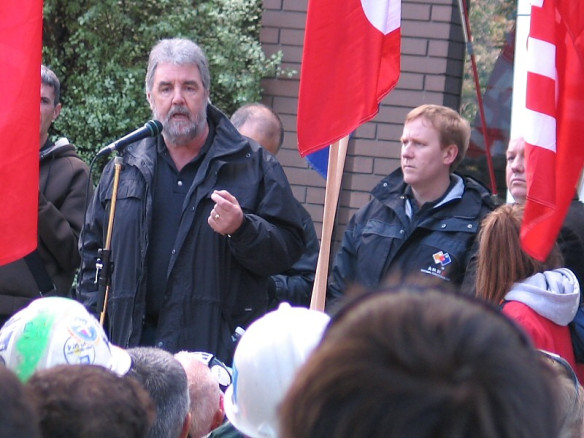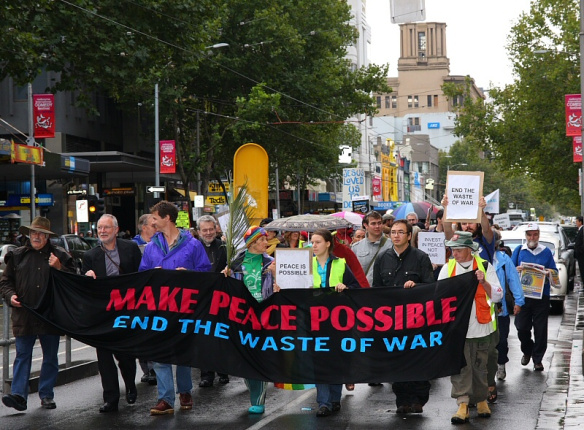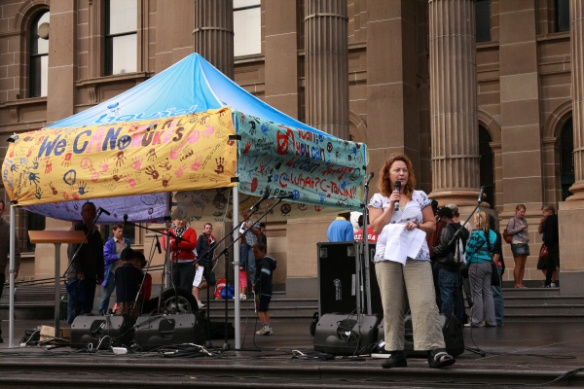
Poster outside the former IWW headquarters
As in past years, while tens of thousands at Melbourne’s Shrine of Remembrance and elsewhere around the country did what they thought appropriate, others, numbering hardly more than ten, met outside the former headquarters of the Melbourne branch of the Industrial Workers of the World in a commemoration with a different flavour.
As a speaker recalled, it was the IWW that spearheaded the anti-conscription campaign during WWI without which Australia’s already appalling tally of dead and wounded would undoubtedly have been far greater. It may be worth reproducing here a post on Melbourne Indymedia in January 2007 which set out some of the reasons for this gathering:
“One of the greatest popular victories in Australian history was the defeat of conscription in World War One in a campaign spearheaded by the IWW (Industrial Workers of the World) The Australian union movement owes much to the IWW and the traditions it created; this despite its brief existence as a largish organization. (The IWW survives as a smallish organization)
“Just an example taken at random: the IWW was resolutely non-racist and at a time when conventional wisdom would have us believe that the Australian labour movement was very much whites only. Yet the IWW was influential enough to lead the labour movement opposition to the war and to conscription……and to actually defeat conscription.
“The IWW deserves to be remembered, and so does its anti-conscription victory. I hope that this year we can organize a more large scale event than in previous years. (For info on previous years, fact sheet, and discussion see the links below)
“We can still learn from the history of the IWW and from its greatest victory in Australia.
“The purpose of the IWW commemoration is _not_ a publicity stunt; more to “honour those to whom honour is due”, and to start creating a healthy tradition. With a largish turnout the event could also be very useful for networking of course. The event is _not_ intended to physically confront or tangle with the other thing happening that day …”
(http://www.melbourne.indymedia.org/news/2007/01/138371.php)
Centrepiece of the event was a “War-Tree”, based on a famous cartoon of the period:

Here is how the tree’s maker explained the background in a report of a previous year’s action:
“The “war tree” at the iww celebration was based on [a] famous wobbly cartoon … That capitalist is telling the soldier/worker tending the tree that he can keep its fruit, ie Death etc, for his wages; the cappo only wants the roots…..
“The cartoon in turn was presumably inspired by an old and widespread folk tale about a devil (or troll, or djinn etc) who demands half of a farmers crop…the farmer offers to give the devil everything that grows above the ground and the devil agrees to accept this (and like all magical beings its word is binding). The farmer of course grows carrots or turnips. Next time the devil insists on having everything below the ground, so the farmer grows wheat or barley etc. The folktale tells of a shrewd peasant tricking a powerful but stupid oppressor… sadly, as the cartoon shows, the reality tends to be the other way around…”
(from http://melbourne.indymedia.org/news/2005/04/91104_comment.php#144343 ).

As can be seen from the following photo, the street corner is now on the edge of Melbourne’s Chinatown, and its history is probably not widely known (though anyone interested could take a look at the relevant chapters of “Radical Melbourne – A Secret History” by Jeff Sparrow and Jill Sparrow, The vulgar press 2001), but next year there was talk of making use of the conveniently situated ‘dustbin of history’ …

The street corner today
Here is the text of a leaflet handed out at the action:
[quote]
DOWN WITH MILITARISM
A Turkish Beach
On 25 April 1915, Australian and other troops of the British Empire attempted an invasion of Turkey. It was designed to knock the Ottoman Empire out of World War I and free the Russian Empire to send more troops to fight Germany. Tens of thousands of young men were sacrificed in this sideline to the larger war. The soldiers were told they were fighting for “God, King and country” and that it was “the war to end all wars”. In reality, they were pawns in the clash of two rival imperialist alliances – and the imperialists would be back again for an even bloodier war barely twenty years later.
An Imperialist Army
Before the WWI, Australian troops had been used to support the British Empire in its frontier wars in the Sudan and South Africa. After WWI, the Australian capitalists grew more ambitious on their own behalf, grasping for control in New Guinea and elsewhere in the South Pacific. Since the United States supplanted Britain as Australian imperialism’s senior partner, Australian troops have been sent to kill and die to uphold the power of the US. In return, Australian governments are given a free hand in their traditional South Pacific “back yard” and, more recently, East Timor as well.
Home and Abroad
Today, the Australian military are stationed in Iraq, Afghanistan, East Timor, the Solomon Islands – and the Northern Territory. In Iraq and Afghanistan, they assist the subjugation of countries the United States wishes to dominate. Iraqi and Afghan blood pays Australian imperialism’s licence fee in the South Pacific. In East Timor and the Solomon Islands, the military mission is more directly useful to Australian capitalism. Governments are installed and manipulated, while local clients are instructed in how to ensure the poor endure their poverty compliantly – and, in East Timor, watch their oil reserves looted. Finally, in the Northern Territory, the deployment of the military is a token of the determination of the Australian capitalists to complete the as-yet-unfinished theft of the land from its indigenous inhabitants. Australian soldiers have a dirty job, at home and abroad.
Down with Militarism
The military, as well as being the vehicle for waging external war, are the last line of defence against a population determined to change social institutions. They have no place in a just and peaceful society. The Australian military, imperialist enforcers at home and abroad, are no exception. To eliminate war and militarism forever, we must sweep away all armies, with a workers’ revolution that abolishes the State and capitalism across the world and establishes libertarian communism. It will take nothing less – but we need nothing less, as well.
END AUSTRALIAN IMPERIALISM
Melbourne Anarchist Communist Group
macg1984@yahoo.com.au http://melbourneanarchistcommunistgroup.org/
PO Box 2120 Lygon St North
East Brunswick 3057 25 April 2009
[end quote]
Some links:
http://www.iww.org.au/
http://www.iww.org/culture/antiwar
http://melbourneanarchistcommunistgroup.org/
For previous actions there are reports on Sydney and Melbourne Indymedia sites:
http://sydney.indymedia.org.au/node/50732
http://melbourne.indymedia.org/news/2007/04/143843.php
and already mentioned http://melbourne.indymedia.org/news/2005/04/91104_comment.php#144343
For a brief history of the IWW in Australia, see http://www.takver.com/history/iwwinoz.htm


































